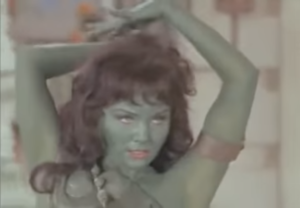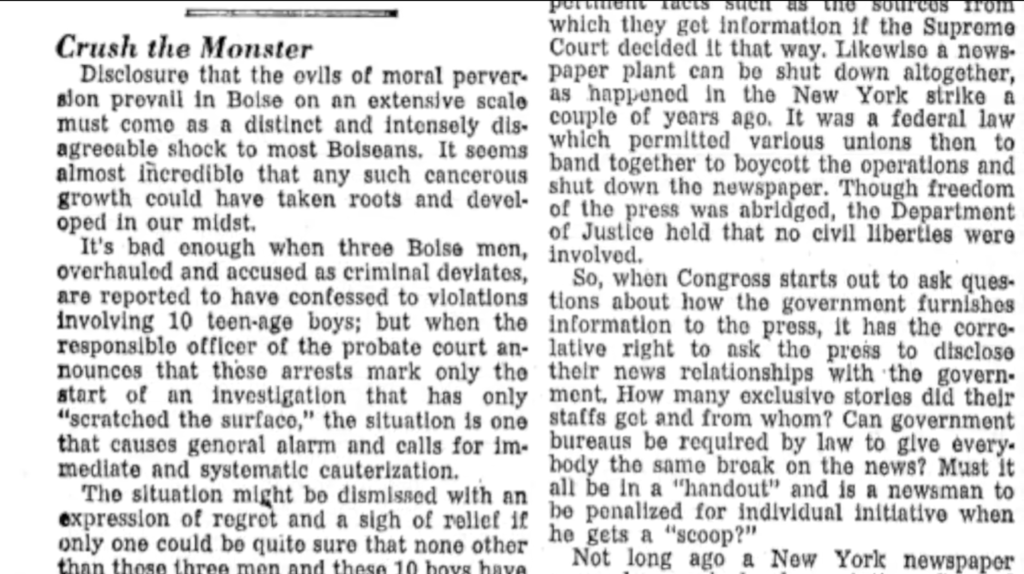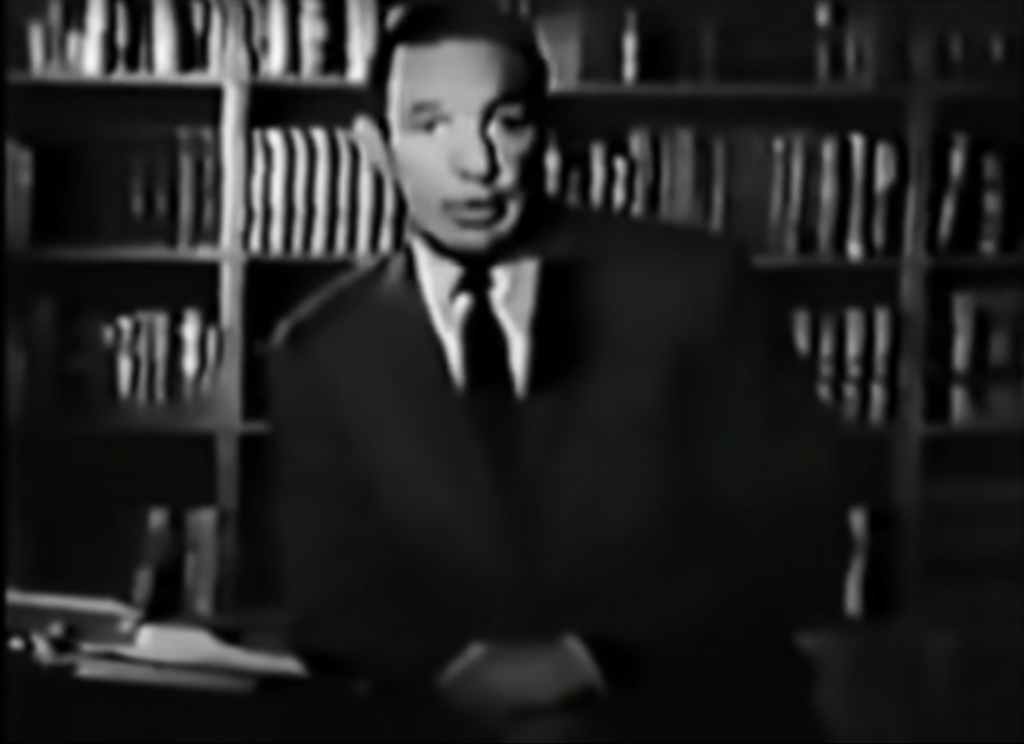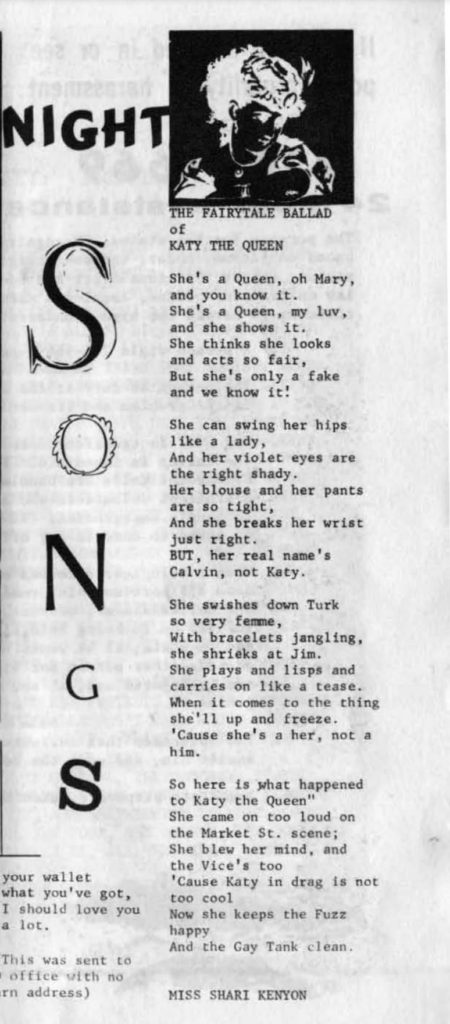Operation: Summarize!

by Gideon Marcus
The Enterprise is checking upon the farflung colony of Deneva, which hasn't sent out a message in a year. One million souls are thus feared for. Captain Kirk has a personal reason to be worried–his brother and his family reside on this planet.
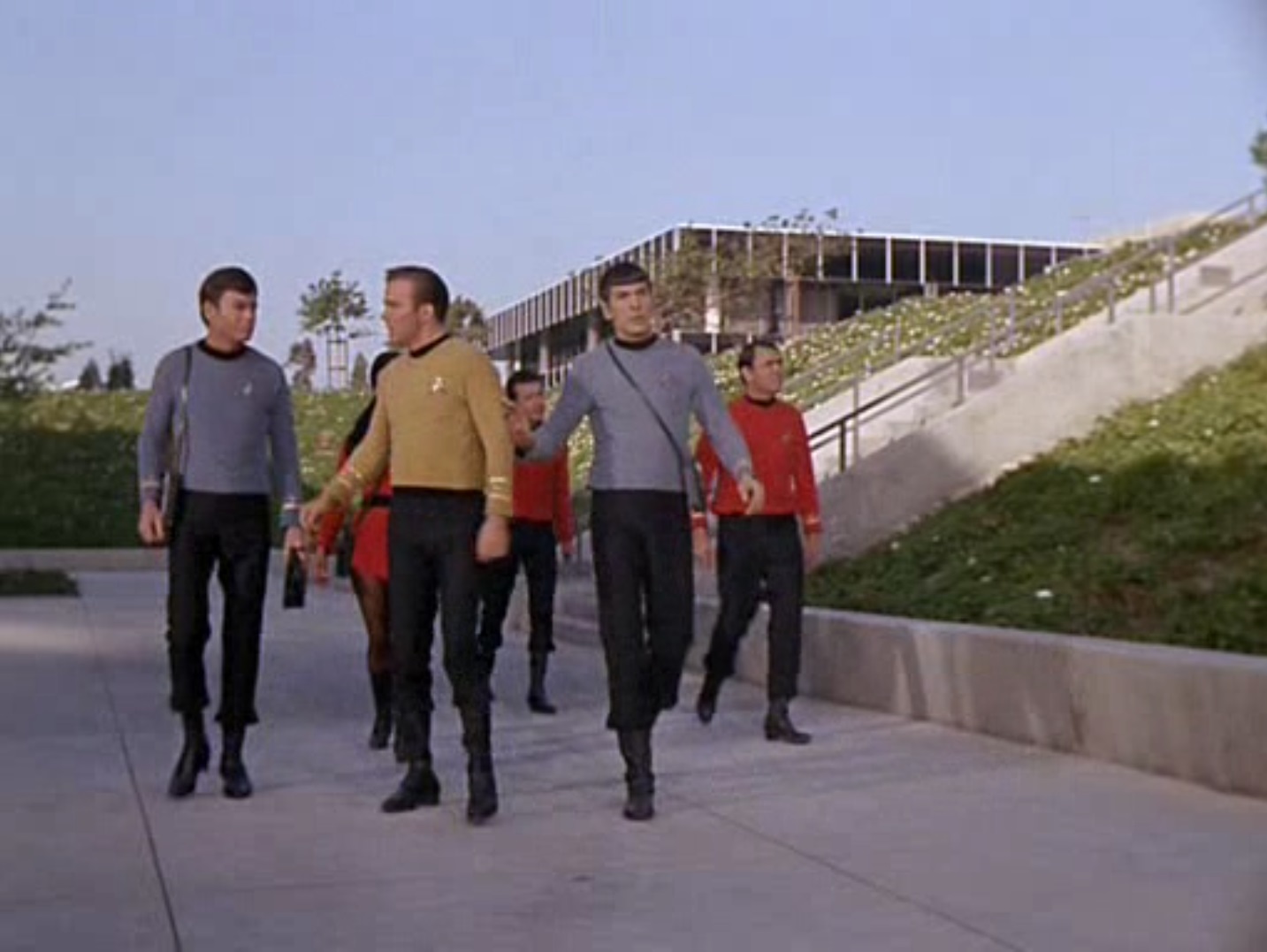
Starfleet's finest head for an interview at TRW.
Their fears are soon realized. Beaming down to the planet, Kirk and co. determine that the entire population has been taken over by parasitic pancakes, who use pain to ensure their hosts to their bidding. They have apparently been waiting for the day a starship came a-calling, so that they could continue their rampage through the universe (why they didn't use the ship they came in is never explained…) While investigating the planet's surface (again, only the most expendable personnel are sent, including Kirk, Spock, McCoy, and Scotty), Mr. Spock is infected by one of the alien invaders.

"Ooo! That smarts!"
Kirk's brother, Sam, is dead, and his sister-in-law, Aurelian, taken aboard the Enterprise for treatment, soon perishes. But Kirk's nephew, the Denevan populace, and Spock may yet be saved. McCoy and the scientists in the Enterprise's 14 science labs throw the book at a monstrous specimen that Spock secures from the planet. No dice. No amount of radiation, heat, or anything else will destroy these critters (or at least, nothing that will destroy them and not also the host.)
There is a clue, however. One Denevan took a shuttlecraft into the sun. Before he burned up, he announced that he was "free" of the alien. This is the clue Kirk needs (and everyone else misses). Apparently McCoy only thought to use infrared (heat) and very high energy radiation (microwaves and X-Rays) since the captain deduces that visible light is the key to killing the beings.
Spock volunteers to enter a light chamber and be subjected to a zillion candles of light. It kills his parasite, but also leaves him quite blind. Turns out they didn't need to use the whole spectrum of visible light. Only the invisible spectrum of invisible light.
Yes, I was confused, too.
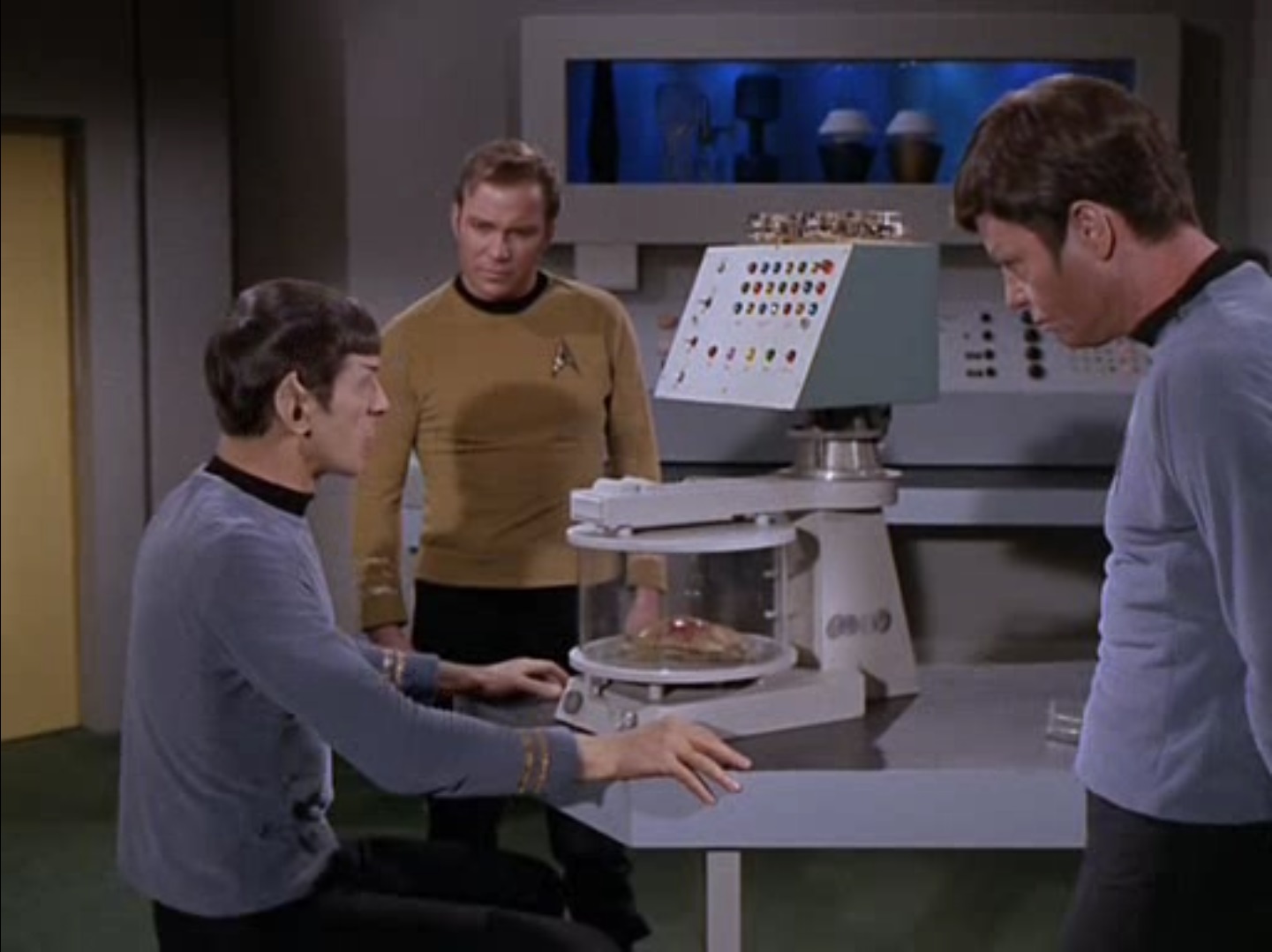
"We've tried everything! Heat! Radiation!" "What about… light?" "Yes, Jim. I said we tried radiation. You think we're stupid?"
Turns out the key wavelength is ultraviolet light. Correct me if I'm wrong, but that's generally lumped in with "radiation", but perhaps McCoy was being extremely narrow in his definition. Anyway, Kirk dumps a bunch of "tri-magnesite" ultraviolet beacons in orbit around Deneva and sets them off. The radiation (that isn't radiation) is so intense that it even kills the parasites that are indoors, but doesn't manage to bake the colonists (maybe the only ones who survived were Black…)
Anyway, there is a lot to enjoy about the episode, from Nimoy's performance (see below) to the absolutely stunning setting (the TRW campus, from which were monitored the space probes of Pioneers 0, 1, 2 and 5, Explorer 6, and the Orbiting Geophysical Observatories).
But the science is ridiculous, even for television. Really Voyage to the Bottom of the Sea stuff. The title is one of the least inspired of the series, too.
It's a bit of a shame that this is the episode that concludes the first season. Nevertheless, the strength of the others we've seen this season suggests we're in for a great time come fall. And in any event, it's certainly not "The Alternative Factor".
Three and a half stars.
Operation: Indecision!

by Jessica Dickinson Goodman
Captain Kirk seemed to be of two – or more! – minds in "Operation: Annihilate!" His curiosity wars with his concern for his ship's safety early in the episode when the Denevan vessel hurls itself into the sun; his fear for his brother Sam and his sister-in-law Aurelean's safety on Deneva competes with his commitment to civility with his crew, leading him to snap at Lieutenant Uhura in a moment of uncharacteristic and uncaptainly unkindness. (To her credit, Uhura responds with complete professionalism and competence.)
But his deepest conflict becomes clear when Commander Spock and Kirk's nephew Peter become the prey of the fleshy flying flapjacks that served as this episode's villains. Kirk watches as Spock is consumed by pain, overwhelmed by it, then fiercely begins to resist it using his Vulcan training. This moment encapsulates the sweet tension that gives this episode its flavor:
Captain Kirk: "I need you, Spock, but we can't take any chances. We'll keep you confined for a while longer. If you can maintain control, we'll see. My nephew. If he regains consciousness, will he go through that?"
Dr McCoy: "Yes."
Kirk: "Help them. I don't care what it takes or costs. You've got to help them."
McCoy: "Jim, aren't you forgetting something? There are over a million colonists on that planet down there, just as much your responsibility. They need your help, too."

"I need you, Spock."
Though Kirk brings up his nephew's fate throughout the episode, it is his relationship with Spock – and his fear for his well being – that drives much of the action. This episode, more than many others, gives us language for that relationship from both Dr McCoy and Kirk himself: "affection," "best first officer in the fleet," "need," someone McCoy needs to "take care of." The look of devastation on Captain Kirk's face when he realizes that Spock might have been permanently injured was powerful, though it did make me wonder if Star Fleet can be so advanced if it has no clear accommodations for blind people. I would hope for more from the future.

"Who put this #$&@ table here?"
Like the other reviewers, I found the science in this episode silly; I kept getting hung-up on how the Ingrahamians were flying in the first place and whether we were supposed to see them as a devious hivemind or a reactive predator. But Kirk's conflict was delicious, the acting was great fun, and it made me check my TV Guide for when the next season starts. See you all back here again in September!
Three stars.
Operation: Genocide!

by Joe Reid
If there is anything that I learned from this week’s episode of Star Trek, it is that Vulcanians are strong and powerful life forms with amazing physical and mental gifts. "Vulcans" on the other hand are the discount Woolworth's version of Vulcanian. I seem to remember that when Mr. Spock was a Vulcanian, he could read the mind of an alien lifeform, get to know that lifeform’s intentions and desires, and find a way to help it. Remember just a few short weeks ago, on the episode, “Devil in the Dark ", where Spock saved a misunderstood creature from the humans that were going to exterminate them? Now in “Operation: Annihilate!”, creatures, intelligent creatures no less, are no longer afforded the benefit of the doubt to be misunderstood. They can only be annihilated.

Woolworth's – discount Vulcans available now…while supplies last!
Dear reader, please forgive my jeering of Spock. As a character, I find him to be a standout and thoughtful character most of the time. Apart from the limited nature of the abilities that he displayed in this episode, I normally find him compelling to watch. The problem that I had with this episode was the handling of the creatures themselves. The nameless, formless, flying, buzzing, lumps of Horta excrement, that conquered 3 planets and had the amazing power to control men and make them build ships. This seems like an intelligent species that is after something. I find myself truly wondering what it was. “Operation: Annihilate!”, completely ignores that, just following along with the dictate presented by the title.
The episode starts out with a mystery. Mass insanity is gripping entire populations on planets and jumping to other planets, and no one knows why. The best sci-fi takes us on a journey of discovery, to find out the whys of whatever the writer has brought to us. This week, we viewers start down a path and are presented with a creature that has more abilities than any that we have seen on the show thus far. It is invisible to scanning. As stated before, it flies, directs populations to do their bidding, and buzzes like a honeybee, for crying out loud.

"I suddenly have a craving for pancakes with honey syrup…"
Kirk and the others at one point of the episode suppose that this creature may be part of a larger organism that exists in a great beyond. After being presented with so many proofs of intelligence, it is disappointing that the crew of the Enterprise, so intent on meeting new life forms, drives forward towards destruction over discovery. Towards demonization of actions, over deconstruction of intent. Towards annihilation over understanding.
This creature had the potential to be one of the, if not the most interesting and complex creatures that we could have witnessed in the cosmos. Instead, these single celled marvels are treated like a disease in need of penicillin. What a waste. If only a proper Vulcanian were present this week, something could have been made from the unsolved mysteries left unexplored in this episode.
2 stars
Operation: Vulcanalia!

by Abigail Beaman
As it turns out, Vulcans are not just pointy-eared humanoids with very little variation to their anatomy compared to humans. We learn an awful lot about Spock's people from this latest episode. Now we did know a few things. One of the earliest examples is that Spock’s blood isn’t a red color, but instead green. This is due to Vulcans' blood being copper-based instead of iron-based like our human blood. But thanks to this episode, not only do we learn more about Vulcans, but we might have learned just how secretive Vulcans are about themselves with other races.

So much to this man…
In "Operation: Annihilate!", we discover that Vulcans in fact have two sets of eyelids, after Spock recovers from blindness caused by the light that kills an invasive alien parasite living inside him. Similar (I guess) to felines, Vulcans adapted these inner eyelids to protect their eyes from the harsh and unforgiving sun on the planet, Vulcan. This allows our first mate, Mister Spock to regain his eyesight after the exposure to 1,000,000 candles per square inch. Yet then an eyebrow may raise, as earlier in the episode when he first loses his sight, Bones blames himself. Bones is sure the damage is permanent and nothing could have saved Mister Spocks’ eyes. Bones not knowing that Mister Spock has two sets of eyelids initially really bugged me. Isn't he the ship's Chief Medical Officer? But maybe it's not his fault that Spock's internals are unknown to him. Maybe Vulcans keep their racial anatomy secret. That would explain why McCoy is so irritated all the time–his patient keeps holding vital information from him!
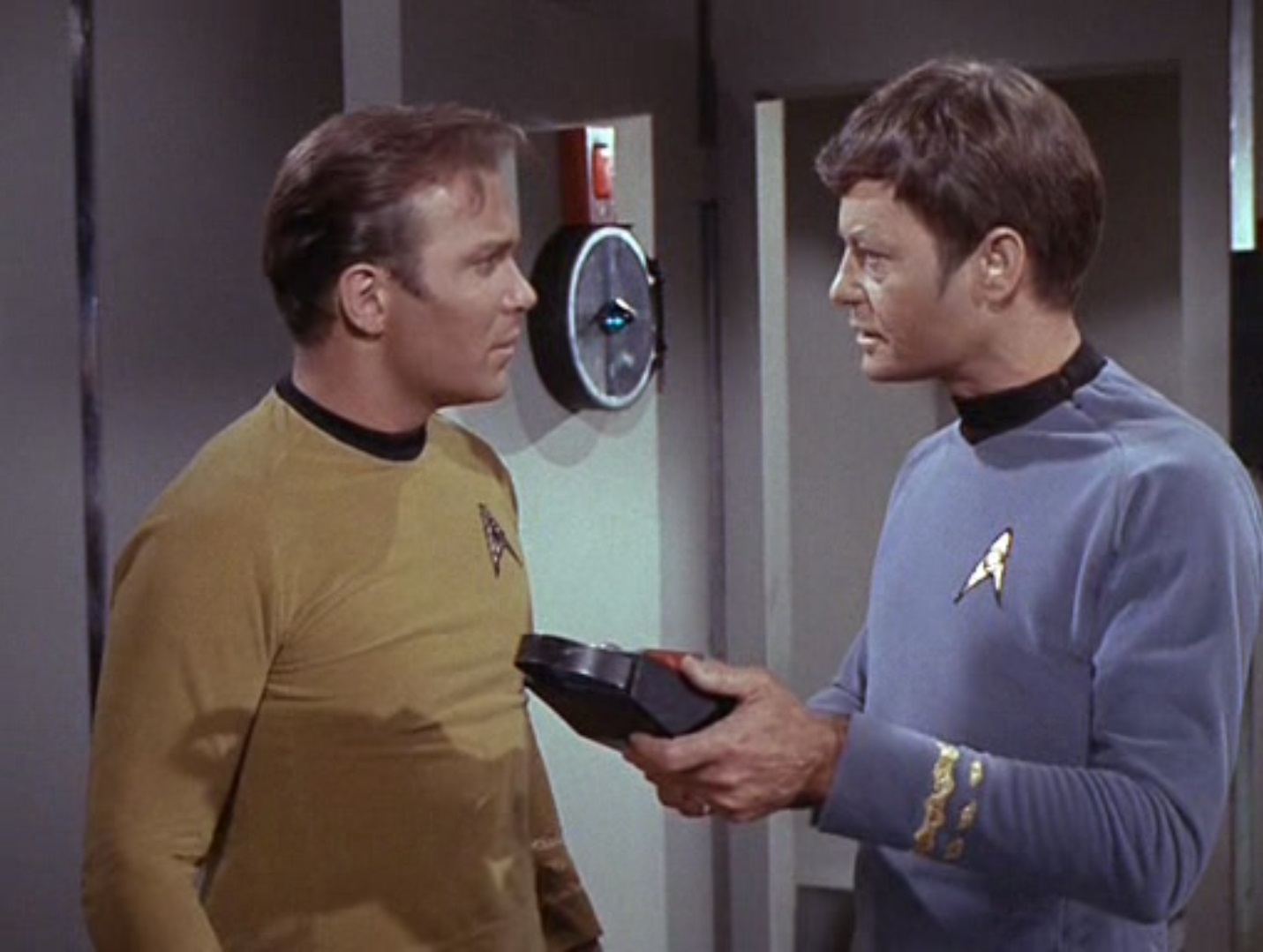
"I blame myself." "I blame you, too!"
Now I’m not saying this episode was good. For the most part, I actually felt very unhappy that this is the episode season one had to end on (hopefully season two will continue on with good episodes like “The Devil in the Dark” or “Shore Leave”). I do in fact feel that the anatomy Daugherty comes up with within this episode is a cop-out to ensure a somewhat happy ending. [Note: Daugherty is the Director. Carabatsos is the writer–those darn credits flash by so fast! (ed)].
Yet something I would also like to point out is Leonard Nimoy’s acting of the stoic and computerized Mister Spock fighting the human emotion, pain. Throughout the episode, after Mister Spock is infected, he tries everything in his Vulcan power to deny the pain he is in. Leonard Nimoy really shows this struggle that Spock faces; his creeps rather than strides, his voice is harsh, and every once in a while, he seems to twitch in pain. It sent shivers down my spine. I was very enthralled by Leonard Nimoy (well at least more than usual) by his acting in this episode. It was probably one of, if not the only saving grace in this episode for me (well also Scotty about to shoot Spock; remind me next time when I wanna pick a fight with him).

"Freeze, Mr. Spock!"
This episode left me empty inside, and for that, I have to rate it pretty low.
Two and a half stars.
Operation: Copycat!

by Erica Frank
The aliens in "Operation: Annihilate!" are obviously inspired by Heinlein's classic, The Puppet Masters, but the differences are definitely for the worse. These aliens don't attach themselves to humans—they sting them once, injecting them with "tentacles" that spread throughout the nervous system. This allows them to control people through pain—pain so bad it can kill. It's unclear how the aliens coordinate their efforts and communicate with each other. (Looks like more evil telepathy. Sigh.) It's also unclear what the aliens themselves do after their planetary takeover, other than flutter around in shady spaces.
These aliens have been moving through planets, causing "mass insanity" and destruction for several hundred years. If the pain immediately killed people, they wouldn't last long enough to reach new worlds. So it seems only the ones who resist control are in danger, or they'd be like a virus that burns out its host before it has a chance to transfer.
Because of this, I doubt Peter—Kirk's nephew—was at risk of death. Rather, he'd likely succumb to the alien control. He'd wake up surrounded by strangers, only to be told his parents are dead. He might well give up fighting entirely; he'd have no reason to push through the pain. So it's unclear why Kirk needs to find an immediate solution.
This episode brings too many questions. While it's common for science fiction to leave possibilities for the reader or viewer to ponder, in this case, the potential answers often make no sense.
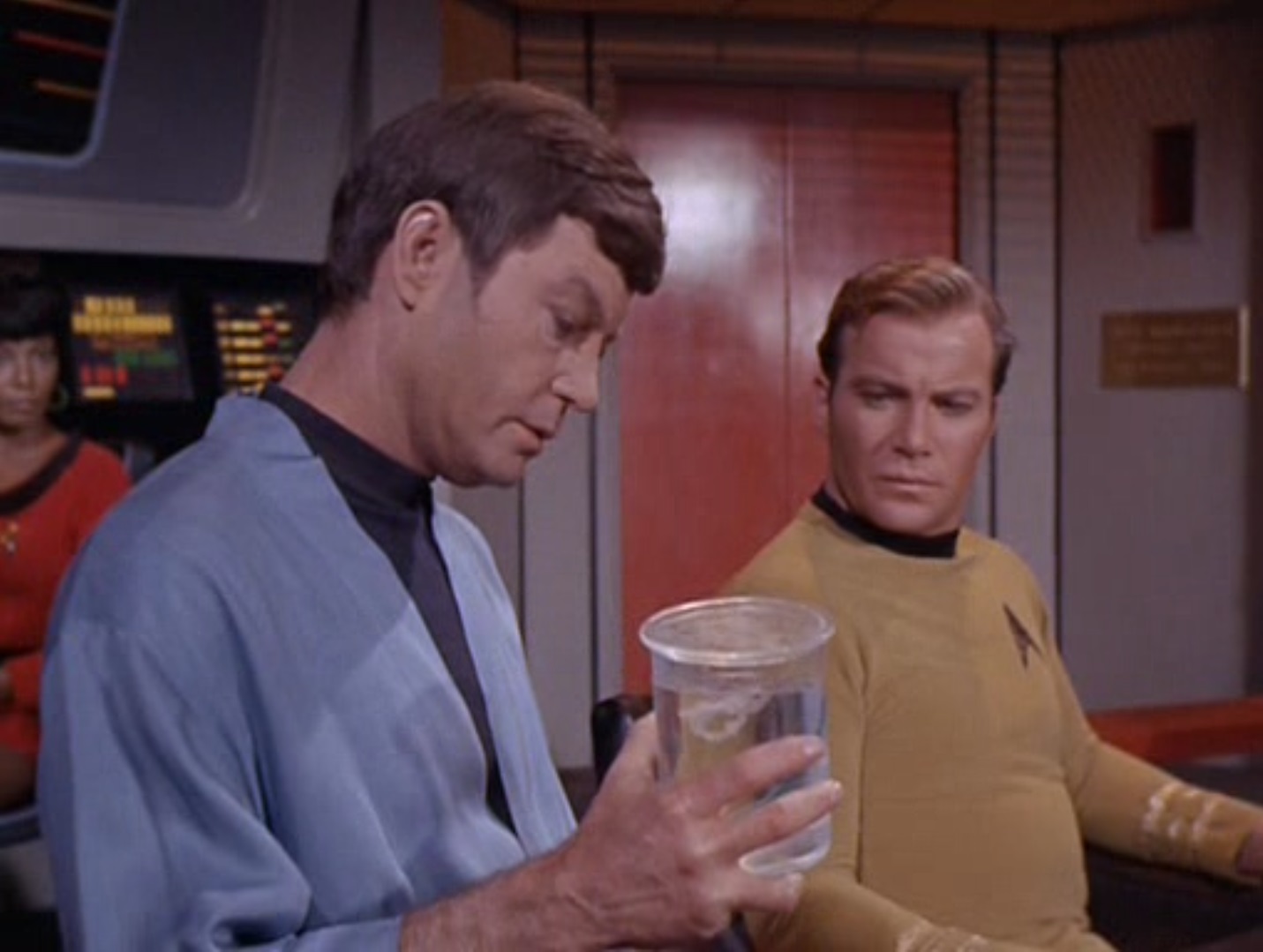
We're supposed to believe large tentacles like these are spread throughout the nervous system… without being visible through the skin? And that removing them wouldn't stop the pain? In that case, what's causing the pain?
Kirk should be able to just declare the planet off-limits, infected, and sabotage its space travel while bringing in a full scientific team. Or will the pain quickly kill people? …In which case, how did the aliens last long enough to get to new worlds, and how have they taken over only a handful of planets in several hundred years? Or are there dozens of others we don't know about?
If they haven't been going through dozens of planets, what have they been doing for those hundreds of years? Do infected humans eventually "hatch" into a swarm of flappy blob aliens that can infect new people? Or do the flappy-blob versions reproduce on their own, with the injected hosts eventually dying along with their tentacles? Do the injected people reproduce normally, and have alien-controlled babies? (Eew.) Or will each child need to be infected?
Regarding their destruction: If they stick to shaded areas, how will bombarding the planet with ultraviolet light reach them? Any of them that are inside buildings will be safe. (And in the meantime, the entire human populace will have very bad sunburns.)
Two stars. While the aliens were interesting and the underlying ideas were good (which makes sense; they were based on a terrific book), the plot itself was disjointed and incoherent. I was more intrigued by McCoy's frequent wardrobe changes than the story itself.
Summer reruns have begun! Join us tonight at 8:30 PM (Eastern and Pacific) for the pilot that sold the series: "Where No Man Has Gone Before!

Here's the invitation!













![[September 12, 1967] Heavens Above! (<i>The Fifteenth Pelican</i> and <i>The Flying Nun</i>)](https://galacticjourney.org/wp-content/uploads/2022/08/sddefault-2-619x372.jpg)

![[July 10, 1967] Return to Collinsport (the gothic soap opera, <i>Dark Shadows</i>)](https://galacticjourney.org/wp-content/uploads/2022/07/BarnabasPortrait-1-620x372.png)










![[July 2, 1967] An Explosive Ending (<i>Doctor Who</i>: THE EVIL OF THE DALEKS [Part 2])](https://galacticjourney.org/wp-content/uploads/2022/07/670702emperor-672x372.jpg)

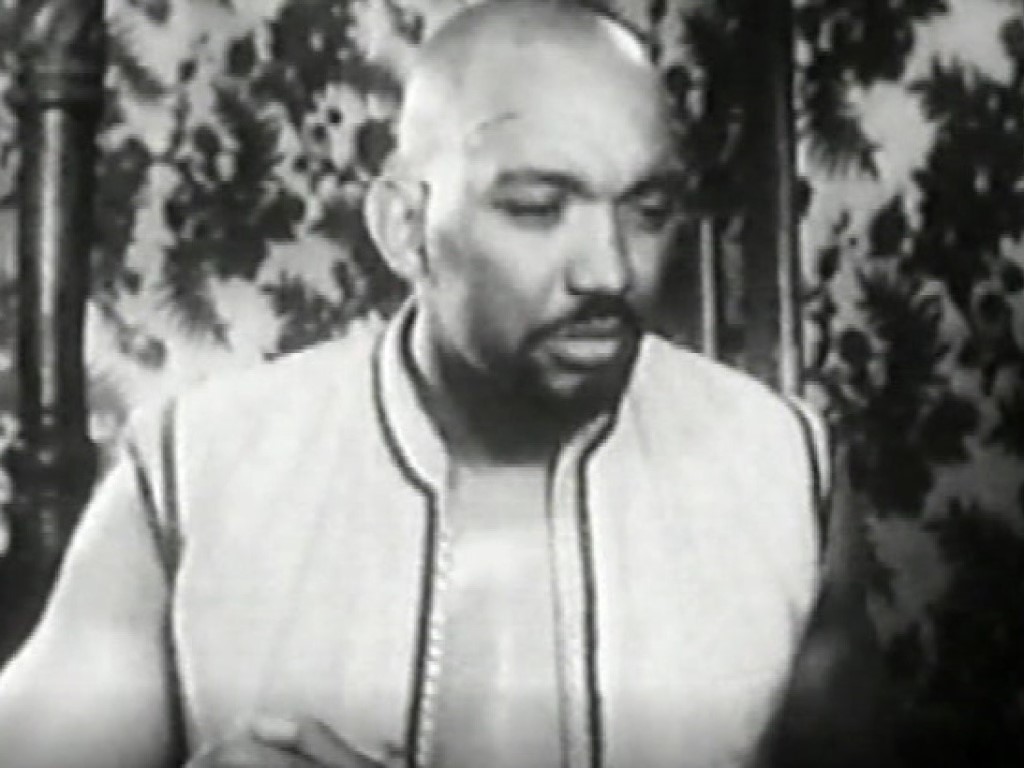
![[June 4, 1967] The Daleks Stoop To A New Low… Vehicle Theft! (<i>Doctor Who</i>: The Evil Of The Daleks [Part 1])](https://galacticjourney.org/wp-content/uploads/2022/06/660604dalek-672x372.jpg)
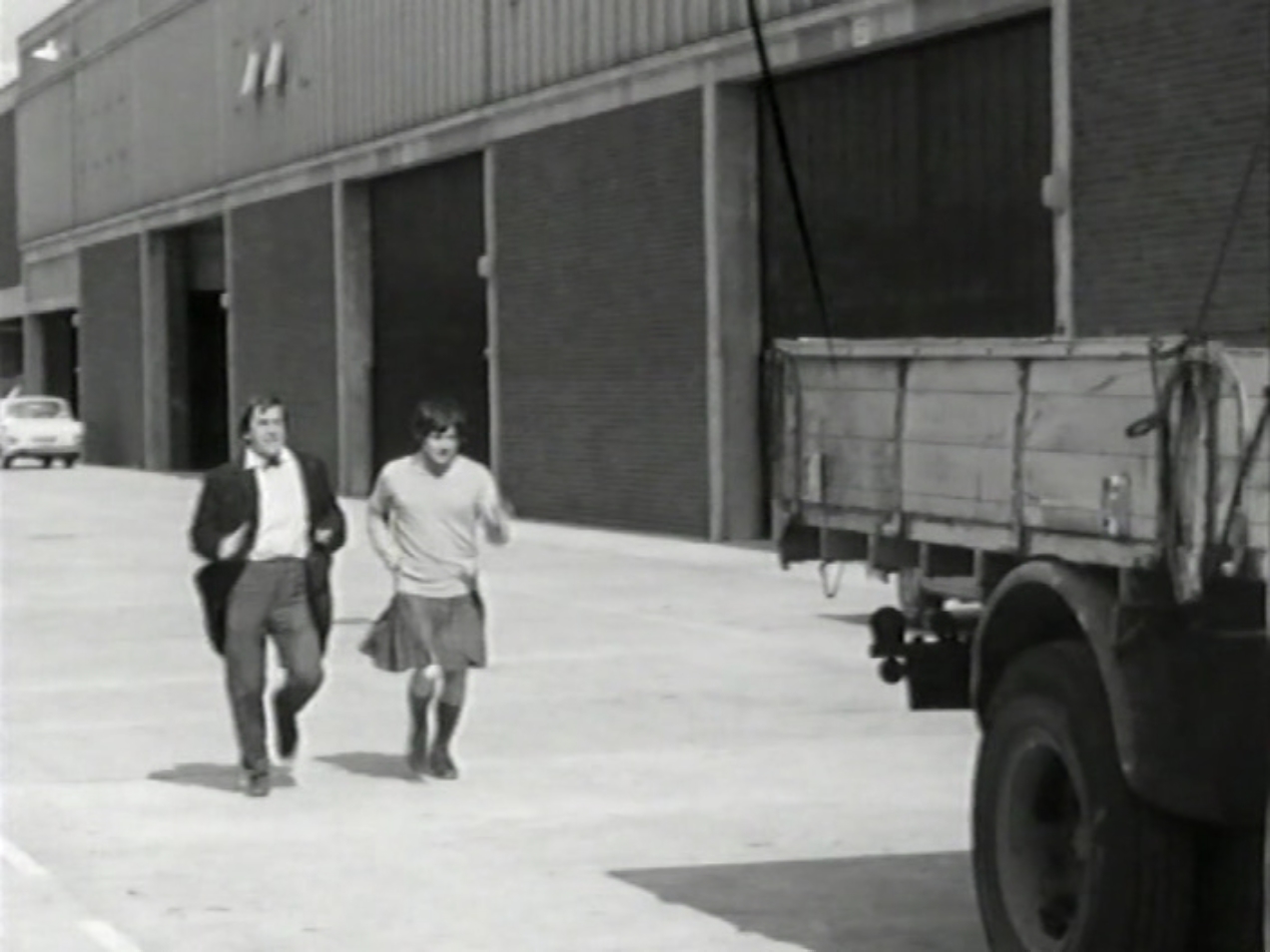
![[May 14, 1967] Ben And Polly To The Departure Gate (<i>Doctor Who</i>: The Faceless Ones [Part 2])](https://galacticjourney.org/wp-content/uploads/2022/05/670514benandpolly-672x372.jpg)
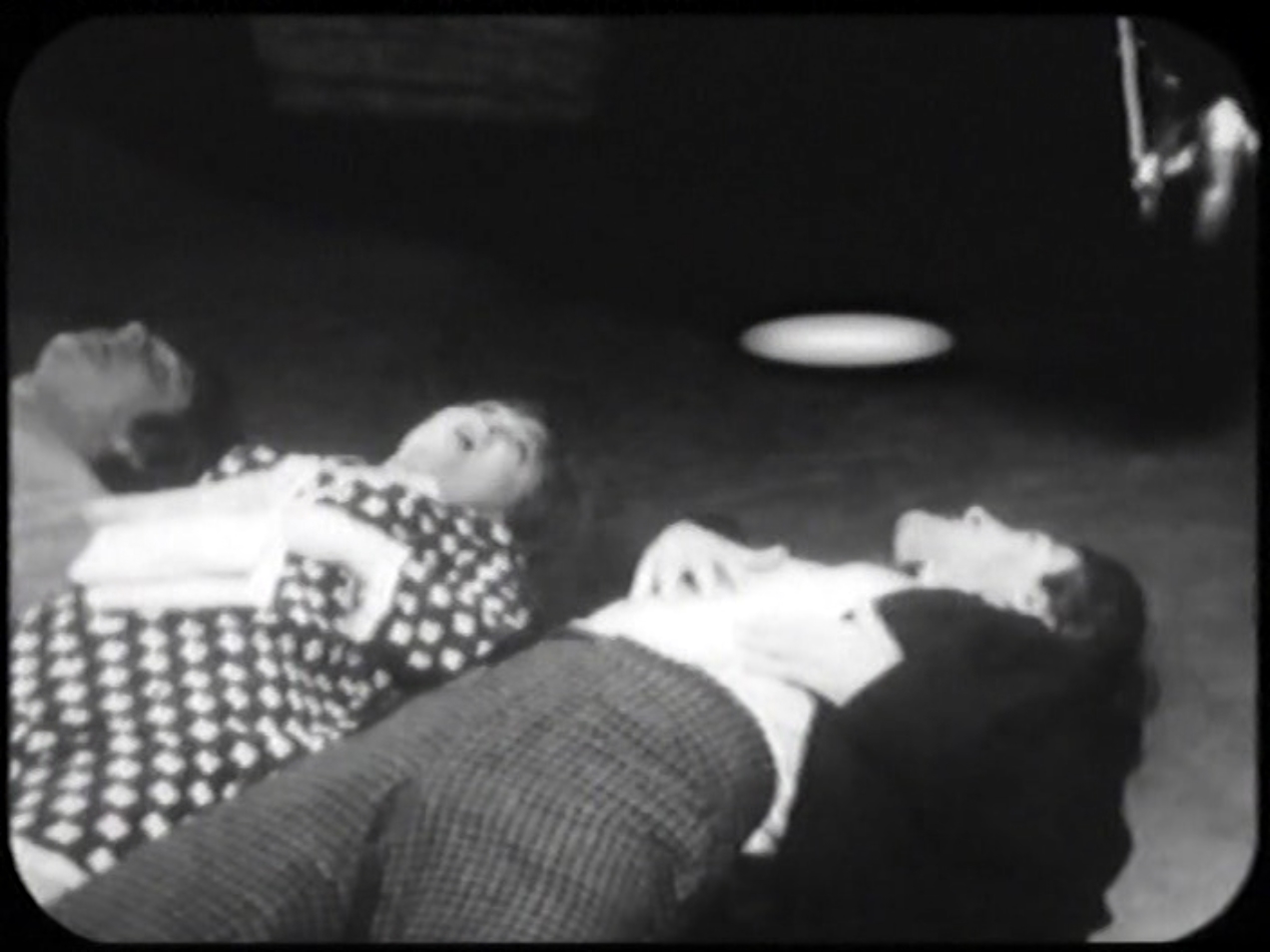
![[May 10, 1967] Float Like A Butterfly, Sting Like A Bee (<i>The Green Hornet</i>)](https://galacticjourney.org/wp-content/uploads/2022/05/670510title-672x372.jpg)


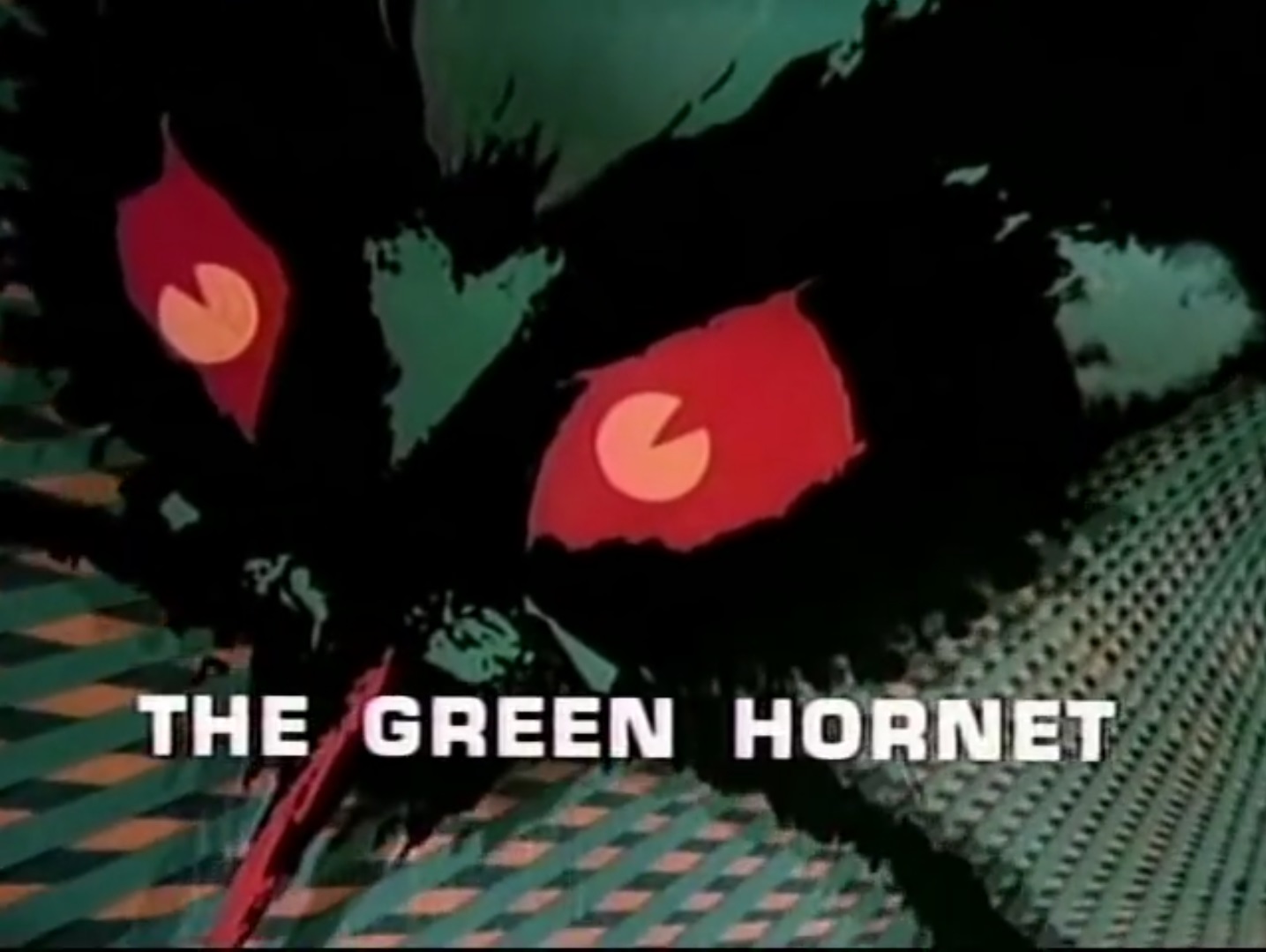
![[April 24, 1967] You Look Familiar (<i>Doctor Who</i>: The Faceless Ones, Part One)](https://galacticjourney.org/wp-content/uploads/2022/04/670424runway-672x372.jpg)
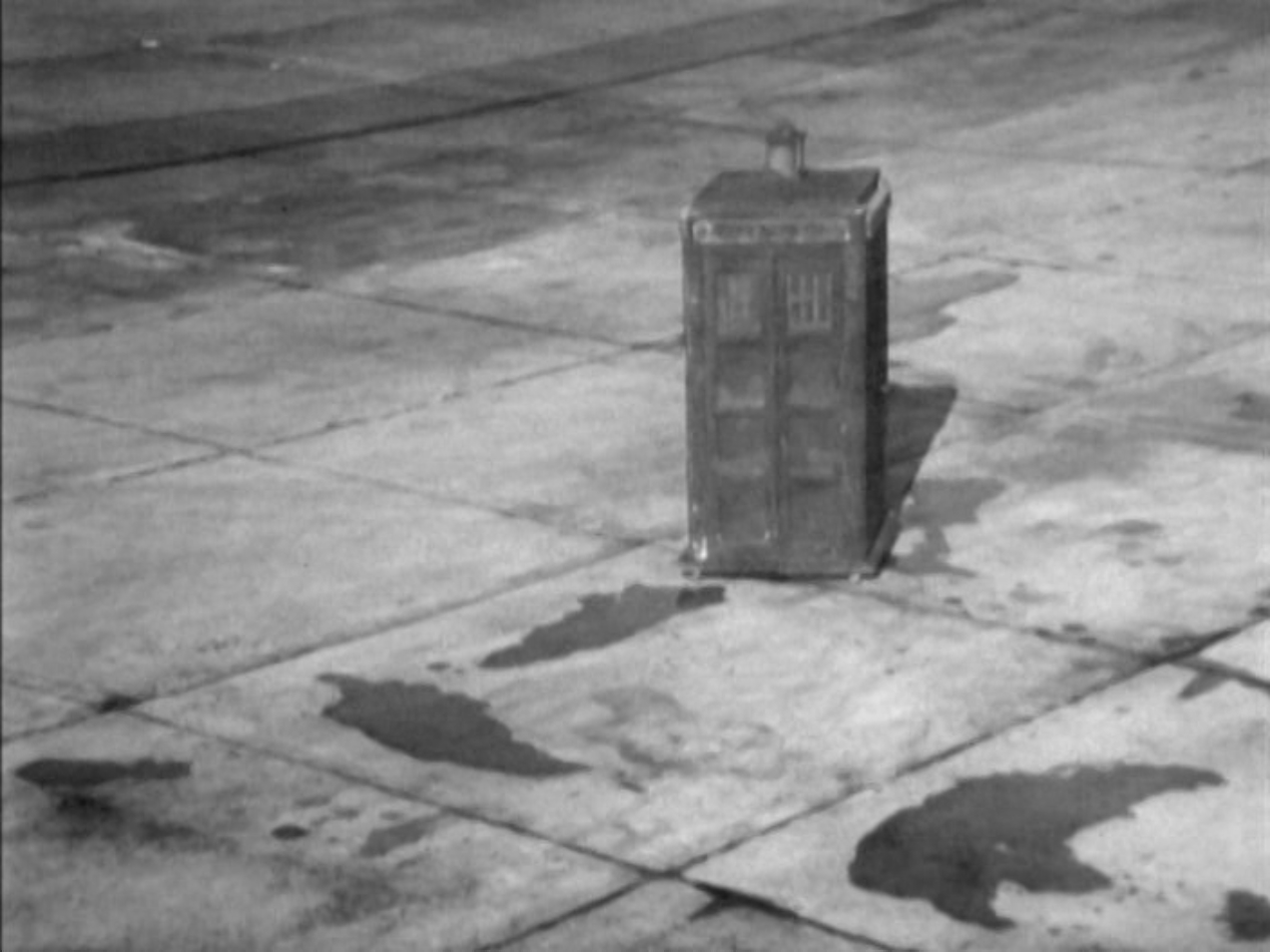
![[April 20, 1967] End of the Road (<i>Star Trek</i>: "Operation: Annihilate!")](https://galacticjourney.org/wp-content/uploads/2022/04/670420title-672x372.jpg)

















![[April 12, 1967] We'll take Manhattan (<i>Star Trek</i>: "The City on the Edge of Forever")](https://galacticjourney.org/wp-content/uploads/2022/04/670412title-672x372.jpg)

![[April 10, 1967] A Queer Dream (the CBS "documentary" <i>The Homosexuals</i>)](https://galacticjourney.org/wp-content/uploads/2022/04/670410homosexuals-672x372.jpg)
